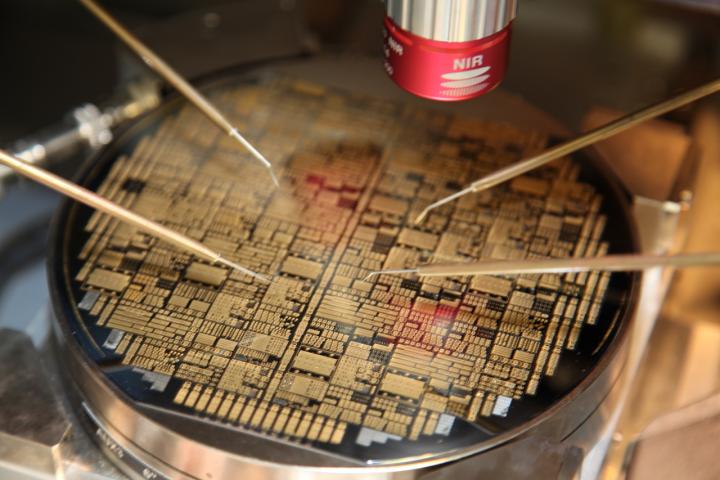Edinburgh Receives £24 Million Boost for AI Innovation
The University is set to establish two research hubs that will focus on developing AI tools to help revolutionise the fields of electronics and healthcare.

Innovative AI
Using AI to develop more efficient semiconductors, design more complex microchips, and improve the early prediction of debilitating diseases are some of the potential outcomes of the £24m funding from the Engineering and Physical Sciences Research Council (EPSRC).
Of the nine centres announced as part of EPSRC’s £80m UK-wide investment in applying AI to real world data and research, Edinburgh will lead or be involved in more than half, further cementing its place as a driving force in the development of AI in the UK.
Edinburgh hubs
The AI Hub for Productive Research and Innovation in Electronics (APRIL) will seek to bring the benefits of AI to the UK electronics industry.
APRIL will develop AI tools to accelerate the development of key components such as new semiconductor materials, complex microchip designs and system architectures – leading to faster, cheaper, greener and overall more power-efficient electronics.
APRIL will be led by Professor Themis Prodromakis, Regius Chair of Engineering, from the University’s School of Engineering.

Tackling challenges
The EPSRC AI Hub for Causality in Healthcare AI with Real Data (CHAI) will develop new ways of unearthing important links in complex health data.
CHAI aims to develop AI that can empower decision making tools to improve challenging tasks such as the early prediction, diagnosis and prevention of disease, and – crucially – to improve the safety of such technology in healthcare.
Researchers hope to apply this new technology to tackle key societal health challenges such as understanding infection, Alzheimer’s, improving cancer treatments, social care, diabetes, and rehabilitation.
CHAI will be led by Professor Sotirios Tsaftaris, Canon Medical/RAEng Chair in Healthcare AI, from the University’s School of Engineering.
Successful and ethical applications of AI in healthcare diagnosis and power-efficient electronics could help to address key societal issues, such as our ageing population, global energy use and climate change. It is an honour and a great opportunity for our engineers to be leading two of EPSRC’s AI research hubs and I very much look forward to seeing what the future brings in terms of new technologies and innovations in AI.
EPSRC funding
Both hubs, led by the School of Engineering, will receive £12m each from the EPSRC and will involve researchers from the University’s School of Informatics, School of Mathematics, the College of Medicine and Veterinary Medicine and input from the Bayes Centre – the University’s innovation hub for data science and AI.
Edinburgh experts will also play key roles in two other AI hubs announced by the government.
The ProbAI hub, led by Lancaster University, will carry out world-leading research in an area known as probabilistic AI.
The AI Hub in Generative Models, led by University College London, aims to create tools that industry, government and the scientific community can use to fine-tune AI models that generate data such as text, images, videos and computer code.
BRAID
A separate Edinburgh-led project on the responsible use of AI has also received an additional £9.6m to fund its ongoing work.
The Bridging Responsible AI Divides (BRAID) programme, launched in November 2022, has received £2m from the Arts and Humanities Research Council (AHRC) to fund 10 six-month studies to define what responsible AI is across sectors such as education, policing and the creative industries.
BRAID will also receive £7.6m to fund a second phase of its programme including creating new rounds of BRAID Fellowships, and new professional AI skills provisions co-developed with industry and other partners.
BRAID is led by Professor Shannon Vallor and Professor Ewa Luger, both based at the University’s Edinburgh Futures Institute.
Leading expertise
The combined investment is further recognition of the University’s world-leading expertise in AI. Edinburgh has a rich heritage in the area. In 1963 it was the first university in Europe to create a research group in AI and computer science.
In late 2023 Edinburgh was announced as the host of three UKRI Centres for Doctoral Training in AI The University will lead in developing the next generation of experts in applying AI to robotics, biomedical innovation and natural language processing.
The University also recently established the Generative AI Laboratory (GAIL), which will push the forefront of generative AI to benefit society and stimulate economic growth. The lab aims to develop techniques for generative AI in key areas such as robotics, drug discovery, medical diagnoses, novel semiconductor technologies and tackling climate change.
The investment we’re pouring into these new projects is only possible as a result of our pro-innovation approach to AI. The AI Regulation White Paper consultation response we’ve set out today will see us forging ahead with that plan, driving forward the next wave of brilliant AI innovations. These hubs will nurture new, cutting-edge breakthroughs, from healthcare treatments and more power efficient electronics to machine learning and chemical discovery. New projects being delivered by BRAID will also help to define responsible AI in key sectors such as education, policing, and the creative industries, ensuring public trust in the technology as we continue to harness its capabilities.
Artificial intelligence is already transforming our world. EPSRC supports world-leading research to unlock its potential and ensure it is developed and used in an ethical and responsible way. Long-term research funding has led to revolutionary advancements that have made AI a powerful tool for many applications. These hubs will deliver revolutionary AI innovations and tools in sectors from healthcare to energy, smart cities and environment. They will achieve this by solving key challenges and improving our understanding of AI helping to drive the increased productivity and economic growth promised by this technology.
UKRI is supporting researchers and innovators to develop the next generation of AI technologies that will transform our economy and society. The investments announced today will help to deliver the capability the UK needs to realise the opportunities of this transformative technology. Through our £1bn portfolio of investments in AI research and innovation, we are supporting the development of new technologies, boosting skills, and accelerating the adoption of trusted and responsible AI.

